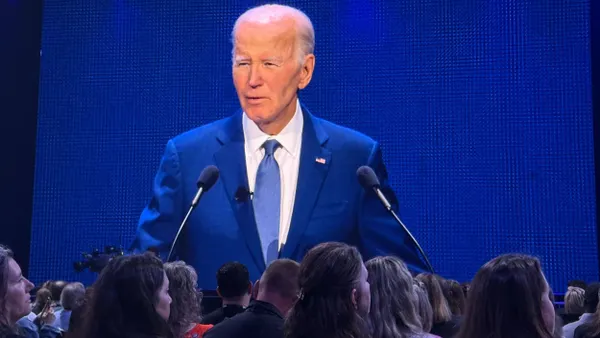Editor's note: Welcome to Resource Actions, our occasional, back-and-forth column covering everything from the bizarre to the day-to-day that, despite everything, impacts HR departments. Associate Editor Katie Clarey will step in for Ryan Golden today. Please feel free to send all tips, thoughts and quirky campaign buttons to [email protected] and [email protected].
Kathryn Moody: I was home in Indiana for about five days this past week, and I heard enough political ads to last me a good many months. It's definitely that time of year again.
Katie Clarey: Yes, our mailbox can hardly shut after our mailwoman delivers all the candidates' fliers and pamphlets every day. Terrible waste of paper, by the way.
Kathryn Moody: And in turn, political talk at work has heated up to the point where some workers are starting to feel the water boil. A fifth of workers in a recent Indeed survey said they wanted more censure of political talk at work — and this was back in September, so you can imagine what some may be thinking now.
This leaves peace-seeking HR managers between a rock and a hard place, as censoring speech at work can lead to both morale and legal problems if handled poorly. But employers have caught on to one way to help employees healthily express their political leanings and keep their water coolers clear of some controversy: paid time off to vote.
Katie Clarey: Think about it. Americans can stick signs in their yards or slap bumper stickers on their cars to show support for candidates, make hundreds of calls and knock on hundreds of doors to volunteer for campaigns or write checks to fund the politicians they like. But none of that will matter if they don't vote. As the basis of political participation within American society, voting is an action that carries the potential to effect change. Yelling at a co-worker during a political disagreement is a lot less productive.
Managers can help politically active workers translate their opinions into action in a place where it actually matters — the voting booth. And that suggestion takes on a lot more power when organizations designate time for employees to exercise their civic duties.
Kathryn Moody: I think it goes without saying that employers want to avoid heated arguments in the workplace — especially because more employees than ever expect their employers to not only provide a solid work experience, but also have a voice in the wider national conversation.
This goes back to another huge aspect of HR management right now: branding and values. Companies are feeling pressured to be loud and proud about some beliefs, according to various studies done on volunteerism and corporate social responsibility. Being vocal about voting accessibility — and then walking the talk — could go a long way for employers looking for a careful balance regarding political speech.
Katie Clarey: This isn't a new idea. Asana, Dropbox, Lyft, Patagonia and more than 240 other organizations make up a coalition of businesses giving workers time to vote during the 2018 midterm elections. These employers work through an organization called ElectionDay.org, which aims to help employers make it easier for workers to vote. The site gives executives tools and support to implement time off.
Such strategies definitely double as acts of patriotism and employee engagement plays. A new O.C. Tanner study found a link between allowing employees time off to vote and providing them the flexibility that reinforces their well-being and engagement at work. The survey results assessed the engagement and well-being levels of employees in workplaces with paid time off for voting and those without. More than 70% of respondents in voting-friendly workplaces said their job also provides for good work-life balance, and about the same amount said they support their organizations' values. Just 56% in non-voting-friendly offices said their company fosters work-life balance. And even fewer said they would back their organizations' values.
Kathryn Moody: HR can't do much about the heated nature of today's political landscape. But it can encourage a culture of respect and engagement without going too deep into the weeds.












